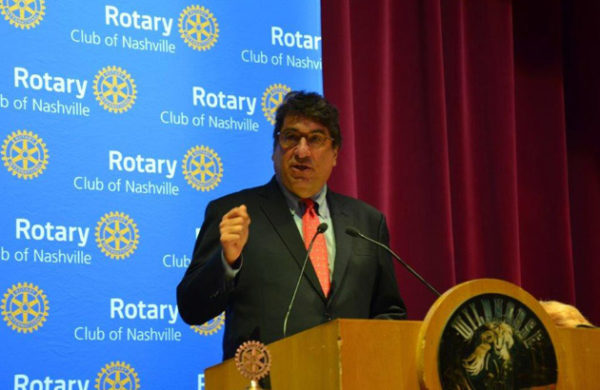In remarks to the Rotary Club of Nashville, Zeppos says the city’s rise is helping Vanderbilt

In a speech to local business and nonprofit leaders, Chancellor Nicholas S. Zeppos emphasized the broad, enduring benefits of higher education—to individuals, society and the city of Nashville itself.
Higher education “doesn’t just help level the playing field,” Zeppos said in a keynote address to the Rotary Club of Nashville on Aug. 27. “It elevates all the players on the field.”
He also reminded the audience that top research universities like Vanderbilt are one of the greatest economic development tools a city can have.
“There’s an old joke: What’s the best economic plan? Build a major research university and wait 50 years,” he said, adding that the average age of a private research university like Vanderbilt is 222 years. “They don’t come along too often. And if you have one in your area, it’s kind of like the four-leaf clover.”
Zeppos noted that Vanderbilt University and Vanderbilt University Medical Center together generated 63,500 local jobs and more than $3.8 billion in labor income—an impact that has more than doubled over the previous decade. Vanderbilt is also a global leader in discovering new therapies for diseases like Alzheimer’s, Parkinson’s and schizophrenia, he said.
“These innovations save lives, open doors to opportunity and strengthen communities,” Zeppos said, highlighting that faculty are the “lifeblood” of the university. “What drives that innovative spirit? I can tell you that at Vanderbilt, it is our people.”
Opening opportunities
In a familiar refrain, Zeppos spoke of higher education as a “vaccine” that helps ensure a measure of health, stability and happiness for those who have it. “Like any vaccine, everyone should have a chance to have it,” he said. “Why isn’t everyone having that opportunity to get that transformative change in their lives?”
Zeppos reaffirmed Vanderbilt’s commitment to offering a “world-class education” to talented students regardless of their ability to pay through the university’s 10-year-old financial aid and scholarship program known as Opportunity Vanderbilt. He cited Vanderbilt’s success in dramatically lowering undergraduate student debt while attracting one of the most accomplished, most diverse freshman classes in the history of the university this year.
Zeppos said the university has raised $387 million for Opportunity Vanderbilt since it launched a decade ago. “And what has it produced? One of the happiest, smartest, most diverse classes in the country.”
Zeppos expressed his appreciation for Nashville’s support of Vanderbilt. “Right now Nashville, and the exciting time we have in Nashville, is boosting Vanderbilt,” he said. “It’s much easier for us to recruit and retain faculty and staff, to bring the best students. … We feel very lucky.”